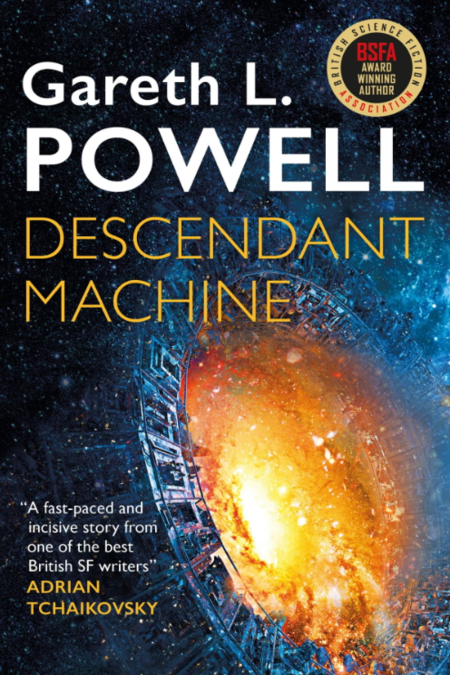One of the biggest tricks of any massively overarching space opera premise is finding a way to deliver on it.
Sure, the back blurb of the novel can sound like a thousand big and impressive elements, and hopefully some small and intimate (but emotionally powerful) human moments too, coming together in one grand crescendo of a narrative, but sustaining that through the length and breadth of an expansive space operatic novel is not always easily done.
Unless, of course, you’re Gareth L. Powell who, it seems has yet find a dazzlingly awesome premise he can’t deliver on and then some, and who proves in Descendant Machine that he is the total sci-fi novel writing package when it comes to take big ideas and making them engrossing reads.
This is a book, that like Stars and Bone, and even the author’s novella-sized but thought-provokingly huge collaboration with fellow British sci-fi great, Peter F. Hamilton, Light Chaser, which pivots on an audacious idea that humanity, plucked from its nearly nuclear-obliterated planet by a powerful entity known as the Benevolence and packed onto the 100-strong Arks of the Continuance, could be, like a number of other races in the galaxy around them, facing imminent and complete oblivion.
Having journeyed through space for over a century in kilometres-long AI-sentient ships which contain all of humanity and its culture and even much of its architecture and biology, humanity has does rather nicely for a species unceremoniously evicted from a world they had trashed to within an inch of its perilously fragile life.
‘Should we tell Kona he’s been manipulated?’
‘I’ll break the news.’
‘And when we get there?’
I shrugged. ‘We’ll see what happens.’
But suddenly this could be placed although to be fair, no one is entirely sure of what lies in wait for them as the novel begins.
Well, to be fair, they sort of do; styled as a report on a major event which is wisely not fleshed out in any way at the start – way to kill narrative anticipation something that Powell never once comes close to doing – Descendant Machine is one of those richly-realised novels which slowly but surely builds and builds to a stupendously big climax.
A climax which, by the way, delivers on the build-up to a degree so satisfying that any fears you might have that Powell wouldn’t stick the landing, and let’s face it, they are near-to-non-existent so assuredly good is the writing every step of the way, vanish in an instant as if they were never there at all.
This is a story that aims big, goes big and finishes BIG but which somehow in the middle of that thrillingly immersive bigness, manages to stay nice and emotionally small and intimate in a way that any good space opera needs if it is to avoid being galactic sound and fury signifying nothing.
Key to the emotional intimacy of Descendant Machine is its protagonist, Nicola Mafalda, a navigator who, permanently bonded with her AI-resident ship, Frontier Chic, who can take human-like form as a blue-skinned “envoy”, is happy zipping through the substrate which provides faster-than-light travel for the people of the Continuance and other alien species who have discovered it.

Nicola is an absolute joy, ballsy and loud and intense but also carrying a heavy emotional vulnerability after a near-death experience caused a schism with Frontier Chic and her lover Kona Molaphlostyn, a member of the six-limbed furry Jzat race with whom humanity has a lasting but sometimes fractious relationship, causes her to withdraw from the galaxy she loves travelling through.
But when an undeniable call for help arrives, Nicola realises she has to forgive both Frontier Chic and Kona and fly back out into a galaxy which promises a lot but which can also take just as much back from you.
This mission which cannot be denied is, narratively, at least, the living, beating, utterly compulsively heart of Descendant Machine, driving the story from one epic moment to another, pedal-to-the-metal action that connects all the dots, never puts a foot, furry or otherwise, wrong and which knows how to finish in a way that feels complete and yet not too easy and convenient.
But what really sells the novel, and goodness that imaginatively gigantic storyline is enough on its own to be worth the price of purchase several times over, is how humanity sits at its core.
Descendant Machine is built on the idea that Nicola, and those she gathers around her, willingly or not, is a good and decent person who wants to do things for all the right reasons.
I rolled onto my back.
In the next few seconds, the remaining two envoys would kill me, then Allergic and Kona, and there wasn’t anything I could do to prevent it.
We were done.
Sure, she can be loud and opinionated in all the very best ways, and honestly you will LOVE how full-on she is because it’s all authentic and delightfully rich and open, but it’s tempered by the fact that Nicola knows what it is to suffer and lose and to be placed in invidious positions where things you value greatly such as the sanctity of human life, is royally and profoundly trashed, and she lives out her beliefs, often when it might very well do her some personal harm.
And in fact, throughout much of Descendant Machine, it does cause her considerable angst and loss and real pain, physical and emotional.
But even when destiny is thrust upon her, eliciting more than a little of her trademark cursing, she follows through, even if it is going to mean the end of everything she knows because Nicola, though far from being a saint and as flawed and broken as the rest of us, is that kind of good and worthy person.
She gives Descendant Machine a sense of innate selfless humanity that brings alive its big themes and extraordinarily driven action in ways that really deeply affect you; the novel might be a massive slice of space operatic perfection that seamlessly brings together some breathtakingly good elements but it’s also got a huge heart and it employs that time and again in a novel so good that you will wonder at how it is such a perfectly rich and amazingly promising premise actually gets to exist in the real world where we are happily able to access it. (It’s worth reading the acknowledgements to find out why, alarmingly and distressingly, this was almost not the case.)
